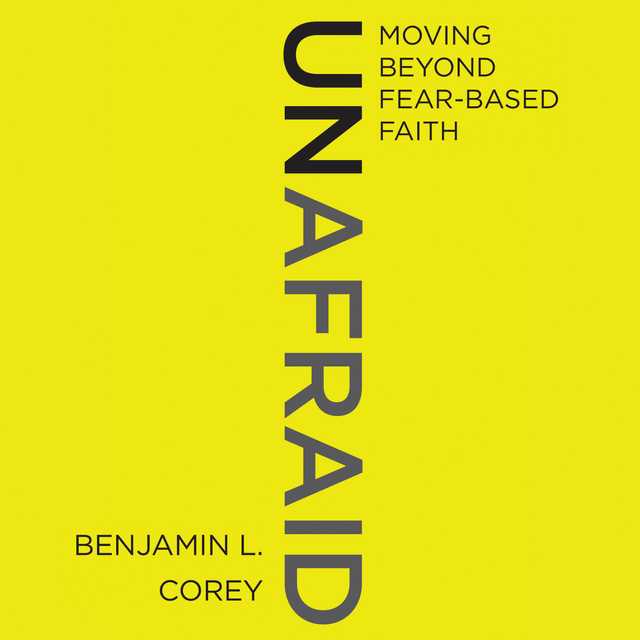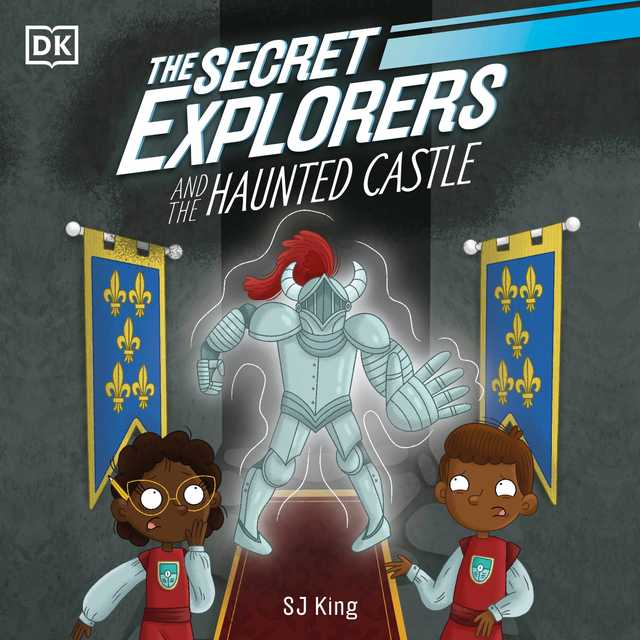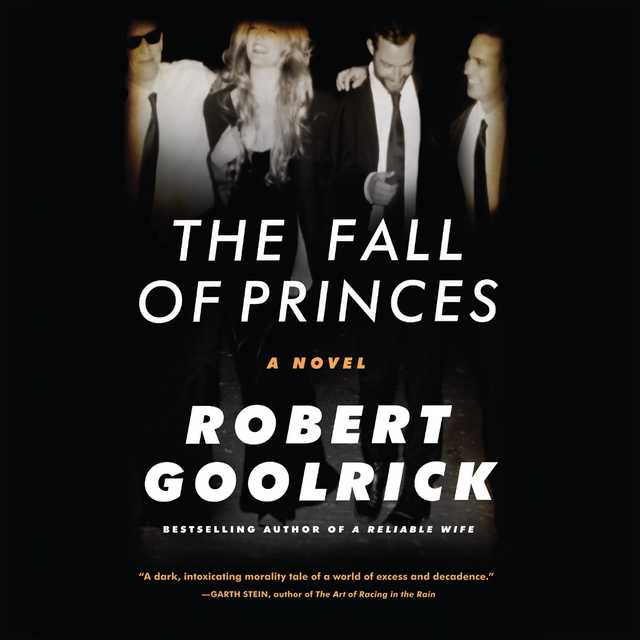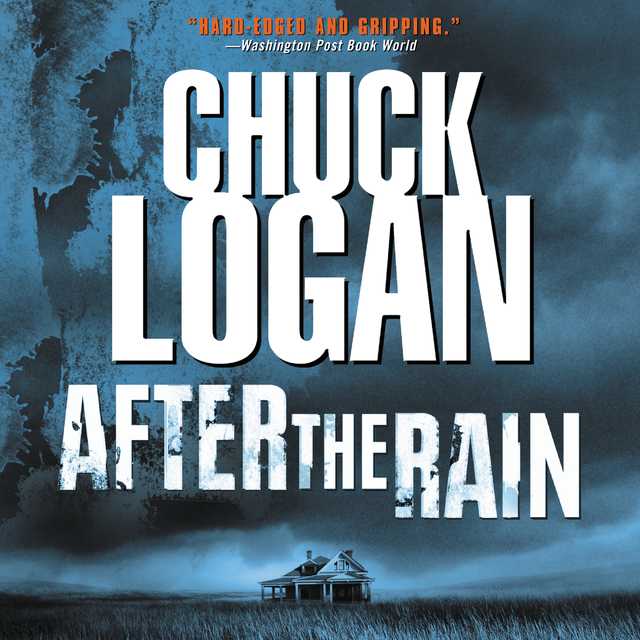Unafraid Audiobook Summary
The popular Patheos blogger and a prominent figure within the Emerging Church Movement and Progressive Christianity explains how the “American Christianity” we are currently taught is actually a fear-saturated distortion of biblical faith.
Benjamin L. Corey thought he was suffering a crisis of faith, but it turned out to be a spiritual awakening.
Corey became aware that the constant fear of hell and judgment that defined his Christian faith was out of sync with the idea that God acts from love, and promises to deliver us from fear. In the wake of this realization came newfound insights–from reading the Bible to re-examining American life and the church’s role in the wider world. Corey learned that what he had been taught was a distorted version of Christianity that was not only untrue but caused real spiritual harm.
He also discovered that he wasn’t alone. Many Christians are yearning to distinguish between the Christianity that has become a rigid American civil religion and the authentic Christian faith embodied in Jesus. As he recounts his own spiritual journey, Corey offers a powerful and inspiring message of hope for every Christian increasingly frustrated with the church today. Do not be discouraged, he assures them. You do not need to give up your faith; you can rediscover the reality of a vibrant Christianity that delivers us from fear and inspires and guides us all today.
Other Top Audiobooks
Unafraid Audiobook Narrator
Patrick Lawlor is the narrator of Unafraid audiobook that was written by Benjamin L. Corey
Benjamin L. Corey is an author, speaker, scholar, and Patheos blogger who is interviewed and quoted regularly across all media. He is the author of Undiluted: Rediscovering the Radical Message of Jesus and holds two graduate degrees from Gordon-Conwell Theological Seminary and a doctorate in intercultural studies from Fuller Theological Seminary. He lives in Auburn, Maine.
About the Author(s) of Unafraid
Benjamin L. Corey is the author of Unafraid
More From the Same
- Publisher : HarperAudio
- Abraham
- American Gods [TV Tie-In]
- Dead Ringer
- House of Sand and Fog
- Prey
Unafraid Full Details
| Narrator | Patrick Lawlor |
| Length | 7 hours 38 minutes |
| Author | Benjamin L. Corey |
| Category | |
| Publisher | HarperAudio |
| Release date | November 07, 2017 |
| ISBN | 9780062790927 |
Subjects
The publisher of the Unafraid is HarperAudio. includes the following subjects: The BISAC Subject Code is Fundamentalism, Religion
Additional info
The publisher of the Unafraid is HarperAudio. The imprint is HarperAudio. It is supplied by HarperAudio. The ISBN-13 is 9780062790927.
Global Availability
This book is only available in the United States.
Goodreads Reviews
Amory
June 13, 2018
Reading a white, male, ex-military, Christian internet celebrity is fairly off-brand for me. Thankfully, I had no idea who Benjamin L. Corey was until he introduced himself in the text, and by then I was already hooked. His journey from fearful commitment to Christianity to confidence in a loving God moved me deeply. He makes it clear that he's not on one political side or another, and nowadays he has just as many questions as answers. I was blown away by how humble, hopeful, vulnerable, and relatable this book felt. Some parts, like analogies between God and us and Corey's adopted children, especially resonated. I don't agree with all of the author's conclusions, but I WISH I did. Maybe I will eventually. For now this book has helped me see a little farther down a path toward love, free of fear. I'm grateful for that.
Alana
January 12, 2018
One of the best books on Christianity I've ever read. A reminder of why I still consider myself a Christian in spite of growing up Evangelical.
Pat
February 10, 2018
One of the best books I've ready recently. The author does a good job identifying the fear that is embedded in so much of traditional Christian teachings. Even if you didn't grow up scared of hell or the rapture, you've undoubtedly experienced the effects of tribalism and the fear of going against the grain. But as the saying goes, we have nothing to fear but fear itself. Oh sure, there are things we encounter along the journey that strike fear or dread in us, but when we stare these issues in the face, choose to name them for what they are, what we've associated with them drains away and we can find freedom. As the author himself says, what he came to "learn on this journey is this: a crisis of faith might not be a crisis at all. What if confronting the things we don't believe is exactly how we discover what we do believe? What if a faith crisis is actually something God has orchestrated in order to free us from false beliefs about him, false beliefs about ourselves, and false belief about others?" (p. 14) Of course, the fear of a crisis of faith is something that many in churches will warn fellow parishioners of and try to steer them clear of of it either out of a sense of their own fear of questions and/or a need to maintain the status quo. However, as with many things, not just matters of faith, "the fear of what we don't know can often be more powerful than what we currently do know" (p. 16).Other insights from the book include:"...I am reminded that it is entirely possible to be so busy trying to follow the follow that a person never actually ends up following Jesus" (p.64).Boy, do I know some folks like this!"I love having my beliefs expanded and challenged" (p. 89). I do too! It's one of the reasons that I find environments that are not open to questions very stagnating. We all see through lenses and "these lenses completely bend and shape our realities; they determine how we assign meaning to our life's events; and they most certainly shape how we view ourselves. But they are changeable, and that's where the growth happens" (p. 93)In reference to traditional end times beliefs, Corey says, "this twisted worldview"....is something that "we eat it because it's what we've always been fed, not because it's actually what's most nourishing--or true" (p. 112). This is true of so many things that are taught in some churches--something we've always been fed and so what we end up believing is sometimes not only wrong, short-sighted, or outdated, it leads us to believe that any teaching introduced to the contrary can't possibly be true simply because it doesn't line up with what we've always believed. Some just cannot bring themselves to accept that maybe what they've always been taught is not up to snuff. Plus, it's easier to just continue with the status quo rather than stretching the mind to new limits. As I said earlier, Corey also takes on the tribalism in churches and says that "fear keeps everyone in somewhat conformity with group norms, because fear of being excluded, forced out, or ostracized acts as chains on our hearts and minds to prevent us from thinking or doing anything the group does not approve of" (p. 130). "Christian tribalism thrives on making new members conform to whatever degree is possible and expelling them if it starts to become apparent that they can't be safely trusted to operate within the boundaries the tribe has set to determine who is a good conservative, a good progressive, or a good whatever" (p. 131). Yes, you read that right, "a good progressive". Tribalism knows no bounds; it can be found in liberal as well as conservative circles and the means for keeping people in line may differ in terms of methods ("fundamentalists will escort you out, while progressive Christians will publicly shame you until you go away"), but the goal is still the same--to prevent individual thought that would seem to conflict with the norms that the group has decided that they stand for. The root, however is fear "because "fear demands we eliminate that which triggers our fear" (p. 131). "If someone gets even one of the answers wrong, that person can easily be seen as a threat because new ideas always have a way of triggering fear in those who aren't ready to be open to them" (p. 132). Of course, this is a fallacy that people buy into--that they have to be accept everything set before them. But in fact, we don't have to! We can decide to mull something over before accepting it and even reject it, if need be, but it certainly doesn't mean doing so by forcing out anyone who dares to think differently. That's where having a broader mind come into play. It allows room for more than one belief in the community. As Corey says, "I came to believe that when others force us to pick a side and give us only two options, a totally legitimate Christian response is to dismiss the invitation entirely and to become a more independent thinker" (p. 156)As we struggle with the constant pull to fit in and assimilate, it would be wise to remember that "sometimes doing nothing gives us enough space to breathe so that we can learn to make better decisions and think rationally again. Feeling like we don't fit can be an extremely uncomfortable position, and our instinct is often to relieve that tension by forcing ourselves to fit somewhere else, even when we don't. For me, doing nothing--realize that I didn't have to be any particular type of Christian right now and that I didn't have to be afraid of that--gave me the freedom to rediscover myself and to find a better expression of faith, without someone else doing the defining for me" (p. 134). As I read this section of the book, I came to the conclusion that sometimes, some people or groups simply are not your tribe, and realizing that is very freeing. You then can walk away without guilt and find your freedom elsewhere. In doing so, you find (or at least I and the author did) "that me was the only thing I was interested in being--because it was the only way I was going to find peace. My life got instantly better the moment I accepted that I didn't have to fir perfectly anywhere on the Christian landscape, and that this would be okay. In fact, I went on to realize that trying to fit within a Christian label was one of the very things that made me feel crazy so much of the time--because that's what label do to Christians" (p. 135).Labels however, in and of themselves, aren't really the problem. They're just words, identifiers. "The issue is...how we relate to the labelsthat start to form us into people who look like anything butthe Jesus of the New Testament"(p. 140). "Second, when we allow our identities to be defined by tribal labels, we slowly become people compelled to fight for and defend the label, even if it means causing harm to fellow Christians. We do this because any perceived threat to the labelbecomes (in our minds) a threat to ourselves, even though this is usually not the case" (p. 142-143). Towards the end of the book, Corey relates an experience in his therapist's office of speaking out loud to God his frustrations and disappointments and then speaking on behalf of God the same thing. This was a powerful experience and even reading it, I could sense the power this experience had in helping to free him from some faulty thinking and behavior that had loomed over him for much of his life.In short, this book is a great read and will be of benefit to anyone struggling with their faith or to remain plugged in to a church system that falls far short of being what it purports to be.
Robert
December 26, 2017
You have heard it said: "Put the fear of God in him (or her)." Christians have often used scare tactics to gain converts. "If you don't believe in Jesus then God will send you to hell, where you will burn forever." Really? If God is defined by love, would God do such a thing? As Benjamin Corey points out in the opening chapter of his book "Unafraid," many Christians have expressed their outrage at the burning alive of a Jordanian pilot by ISIS militants, and yet have no problem believing that this same Jordanian pilot will burn in hell for eternity, because he's not a Christian. Corey writes that "if the theology of of hell is correct, God is like an ISIS terrorist---but like one on steroids" (p. 2). He asks us to consider whether this image of God is a correct one, or at least in line with the message of Jesus? How does such a vision fit with the confession that God is love? If love casts out fear, then how can the fear of God be in us? Benjamin Corey has written a response to those who would use fear to define the Christian faith. He writes as one who grew up in a narrow fundamentalist culture that emphasized the fear of God. Eventually he broke free of that culture, but then found himself among progressive Christians who seemed to be just as narrow, only the form of fear had changed. With fundamentalists on the right, it was having the right beliefs. On the left, it was doing the right thing. Either way, the message was fear-inducing, and such a vision continued to bother him. So, we have this book. It is a response that calls for a sense of balance. More specifically, it is a call to center one's faith in Christ, and be less focused on boundaries. This is a very personal book, for Corey wants to tell his own story, and offer a way out of narrow confines. At the end of the book he admits that the book is about himself, but that he wrote it for others who have had similar journeys. It's important to remember that each of us has a different journey and a different vantage point. So, as a reader and reviewer, my experiences may have parallels, and yet still be different.Corey speaks of having a spiritual mid-life crisis that led to a loss of his church, pastorate, friends, all because he of changes of perspective on issues like guns and gays. He found himself questioning his faith, and on the verge of leaving all together. He found liberation among progressives, but then found himself facing a different set of challenges. As I read his story, I saw a pattern present that I've seen in others. It seems that many who start out in very conservative (and possibly liberal) environments swing all the way to the other end of the spectrum, and find that equally frustrating. Perhaps it's safer to have shorter swings (that is my experience). I must admit that while I did spend some time among rather conservative Christians, and took on some of the beliefs of that community, I didn't start out there. In fact, I started out in the Episcopal Church, and I didn't learn much about hell in that context. So when it came time to leave behind some of my conservative beliefs, it wasn't that difficult. Again each of us has a different story.There is much to like about this book. I have a few qualms here and there (at one point, for instance, I thought I saw a bit of supesessionism, when Corey was dealing with how one reads the Old Testament, but he didn't linger there). While he mentions community a few times, it seems as if, from my reading, Corey's journey is rather individual. He says little if anything about being involved in a congregation (as a pastor I know that even the best congregations have their issues), and I wish he had said something about what it means to be in community. He seems averse to tribes and labels, but at least in most mainline circles, there is little overt tribalism. I'm Disciples, which was an early "no-labels" effort, but I get along just fine with my ecumenical partners. In fact, I rather enjoy working with people across tribal boundaries. We have our differences, but they don't prevent us from working together. So, I'm wondering, has Corey experienced that ecumenical reality? With that said, I do appreciate the emphasis on love over fear. To be a Christian, to be a follower of Jesus, should not be defined by fear. I gave up "hell-fire" a long time ago. I stopped for awhile at annhilationism, but ultimately I came to believe, as I believe Corey believes, in the end God will welcome us all into the realm of God. There might be some fire, but it simply burns off the dross. Having experienced the boundary police on both the left and the right, Corey has tried to come to a more centered position. I don't mean centrism as in moderation, but simply being centered in Christ. Corey has doctorate in Intercultural studies from Fuller Seminary. In that context learned about the difference between centered-set reality and bounded-set. That language was developed by Paul Hiebert, a long time Fuller professor of mission and anthropology. I too have embraced that vision (I'm a Fuller graduate as well, though from the School of Theology). In that vision, faith is understood in terms of moving toward the center, which is Christ. If, Jesus reveals the essence of God, which is love, then that center toward which we are moving is love. If we move toward love as evidenced by Jesus, then we can say good bye to this God of Fear. Corey writes near the end of the book that his "in-versus-out approach to the Christian journey--one that was measured by either right thinking or right doing -- had completely side tracked me from my ultimate purpose of living. Instead of expecting me to rigidly focus on getting my theology right or getting my behavior right, God really wanted me to focus on moving in the direction of Jesus, which naturally expands our capacity to love" (p. 219). My hope is that this book can help others who are stuck in fear based religion to break free and find a new vision. As we do this, we need to be careful with how read Scripture, especially the Hebrew Bible. As a Christian I read the entire Bible through the lens of Jesus, but if I'm Jewish I will read it with a different lens, and still experience God's love. One can enjoy living within a faith family without engaging in tribalism. I'm a Disciple because that fits me, not because it is a superior tribe. In the end, let us heed the word of the angel to the shepherds in the fields as they witnessed the angel choir singing praise to God: "Fear not, for I bring you good tidings of great joy!" Indeed, Fear not, for God is love, and Jesus reveals that love to us.
Peter
August 19, 2019
The book starts out kinda slow and wordy, he probably could have easily condensed the first 50 pages into 5 or 10, but I'm glad I didn't stop reading because there are some important points made, especially about how denominations tend to function like tribes and people need to conform without questioning the beliefs to remain in that tribe. He talks about many Christians operating on a basis of fear because of how they have been taught to view God, hence the books title "Unafraid" referring to the freedom he himself found (no longer afraid of God who is in reality love and therefore not to be feared), and he would like to see others come to experience that same freedom/way of believing. Benjamin writes from his personal experience, and many will be able to relate to certain aspects of his struggles that he has had to overcome. Many would see some of what he writes as heretical, or on the verge thereof. I personally think everyone should have the right to tell their story and be heard. Some chapters I would have given 2 stars, and some 5, so I opted for 4 (3.5 wasn't a choice:-), since it really was difficult to put down the book at times.
Pat
May 03, 2019
It's not for everyone. Not even for all believers in Jesus. It will offend and challenge and some people don't like that. But if you are at a spot where what you have always believed doesn't make sense anymore, where you have been burned by the church or other believers, where you have walked away from established religion (Christendom), or where you you are open to admit the Bible's mixed messages and the cognitive dissonance that follows, then this book might just be for you. I have enjoyed Mr. Corey's writings for some time, but I appreciate knowing his story behind his words.
Steve
June 25, 2020
I have to admit I fit into the category of, as Frank Schaeffer calls it, "an atheist who believes in god": someone who is not convinced by the argument that I should believe just because there's this really old book that says I should or else I'm going to suffer the eternal consequences. I've been turned off by all the religious clubs I've been a part of. Lots of reasons for that. If you want to sit down, we can have a beer and talk about it... Our current crop of rabid bible-thumping (but not bible-reading) cultists wouldn't accept Jesus if he raised someone from the dead in front of them and then had a fish fry ("cuz you know he's an immigrant..."). All that to say Corey's book brought it all down to a simple fact: it's not the book; it's the person. We don't have to appease an angry god who's just looking for a reason to drop us into an everlasting volcano. Jesus isn't standing between us and an abusive deity... because he is the deity. There's no one behind him. He said it's finished and it is. It's over. Now it's okay to deal with all the wrong beliefs and try on some new ones. The "but what if you're wrong" accusation isn't worth considering. I think I've kind of known that for a while now. It's just nice to hear it from somebody else. It also takes the responsibility away from me for other folks' salvation. Too much pressure. All I have to do is take care of them. That's much easier and much simpler. There's more to it than that (basically the idea of hell is so we have some place to send people we don't like to), but that'll do for now.
Pam
December 05, 2017
I became acquainted with Benjamin through his book "Undiluted". This book ("Unafraid") actually spoke loudest to me as I emerged out of fundamentalism years ago and evangelicalism about 12 years ago. His words described my journey to a T and it was all about refusing to be afraid any longer. I refused to be afraid of the Father. I refused to be frightened by the (empty) threat of hell. I lost many friendships when I left evangelicalism and it even affected my marriage but I could not remain AFRAID any longer because I was a at the point of risking my most important relationship - the one with Jesus. I was not willing to risk losing that most intimate of relationships.I urge you to read this book, especially if there is something within you crying out that there has to be something more than a relationship built on fear. And grab "Undiluted" while you are at it.
Rita
October 25, 2018
Finally, a book that addresses all of the things that keep sitting in the back of my head with that wee small voice saying "but what if you are wrong". I don't agree 100% with everything written but it definitely gives me food for thought along with some historical information to follow up on. If you are questioning the idea of God punishing people in hell and not a God of love, read this book and get out of it what is meant for you.
Jackie
February 07, 2019
This one is a mind-blowing game changer. For those of us trying to come to grips with our Christian journey, we'll see a kindred spirit in Corey. His arguments are profound and some are downright gestalt switches from everything most of us have ever been told about faith. I will definitely read this again.
Julie
April 18, 2018
Do Recommend My family and I read this together and loved it! We read a blog post of his that led us to this book. Lots of good things and lots of stuff to think about! Interestingly, specific chapters spoke to each of us as we went along, which made the whole experience that much more powerful.
Lindsey
April 08, 2018
It got a little repetitive for me, but I rated it 4 stars because I think it is such an important message: we are beloved, we are made to make the world a better place, God is with us. Do not be afraid.
Emily
November 12, 2018
Really quite good.Lots to think about, Scripture quoted and unpacked.
Patricia A. Sjöberg
December 29, 2018
I strongly recommend this book to anyone who wants to seek God, but is turned off by evangelical fundamentalist Christianity.
Amy Obrist
February 27, 2018
Great book!Thanks, blc, for a new perspective on the ways that church and Christian doctrine can get in the way of love and indeed Jesus.
Most Popular Audiobooks
Frequently asked questions
Listening to audiobooks not only easy, it is also very convenient. You can listen to audiobooks on almost every device. From your laptop to your smart phone or even a smart speaker like Apple HomePod or even Alexa. Here’s how you can get started listening to audiobooks.
- 1. Download your favorite audiobook app such as Speechify.
- 2. Sign up for an account.
- 3. Browse the library for the best audiobooks and select the first one for free
- 4. Download the audiobook file to your device
- 5. Open the Speechify audiobook app and select the audiobook you want to listen to.
- 6. Adjust the playback speed and other settings to your preference.
- 7. Press play and enjoy!
While you can listen to the bestsellers on almost any device, and preferences may vary, generally smart phones are offer the most convenience factor. You could be working out, grocery shopping, or even watching your dog in the dog park on a Saturday morning.
However, most audiobook apps work across multiple devices so you can pick up that riveting new Stephen King book you started at the dog park, back on your laptop when you get back home.
Speechify is one of the best apps for audiobooks. The pricing structure is the most competitive in the market and the app is easy to use. It features the best sellers and award winning authors. Listen to your favorite books or discover new ones and listen to real voice actors read to you. Getting started is easy, the first book is free.
Research showcasing the brain health benefits of reading on a regular basis is wide-ranging and undeniable. However, research comparing the benefits of reading vs listening is much more sparse. According to professor of psychology and author Dr. Kristen Willeumier, though, there is good reason to believe that the reading experience provided by audiobooks offers many of the same brain benefits as reading a physical book.
Audiobooks are recordings of books that are read aloud by a professional voice actor. The recordings are typically available for purchase and download in digital formats such as MP3, WMA, or AAC. They can also be streamed from online services like Speechify, Audible, AppleBooks, or Spotify.
You simply download the app onto your smart phone, create your account, and in Speechify, you can choose your first book, from our vast library of best-sellers and classics, to read for free.
Audiobooks, like real books can add up over time. Here’s where you can listen to audiobooks for free. Speechify let’s you read your first best seller for free. Apart from that, we have a vast selection of free audiobooks that you can enjoy. Get the same rich experience no matter if the book was free or not.
It depends. Yes, there are free audiobooks and paid audiobooks. Speechify offers a blend of both!
It varies. The easiest way depends on a few things. The app and service you use, which device, and platform. Speechify is the easiest way to listen to audiobooks. Downloading the app is quick. It is not a large app and does not eat up space on your iPhone or Android device.
Listening to audiobooks on your smart phone, with Speechify, is the easiest way to listen to audiobooks.






























